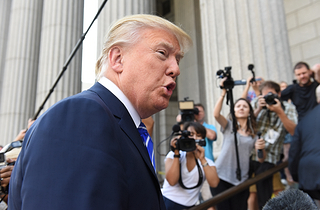 It comes as no surprise at this point, Donald Trump is still refusing to say whether he will accept the results of the presidential election, whatever they are. This time, it came in the form of two separate radio interviews in the swing states of Florida and Ohio. First, here’s what he said on Tampa’s WFLA, courtesy of CNN:
It comes as no surprise at this point, Donald Trump is still refusing to say whether he will accept the results of the presidential election, whatever they are. This time, it came in the form of two separate radio interviews in the swing states of Florida and Ohio. First, here’s what he said on Tampa’s WFLA, courtesy of CNN:
Well if I think there’s something that was wrong. Did you notice, when I brought this up a few months ago, Obama, and others said, “oh, this is the foundation of our country” but eight years ago, he was was basically saying that Chicago is rigged. I don’t know if you saw that clip. But he talks up, like, ‘oh, this is the foundation how dare he question the foundation’ and all of this. Oh, give me a break. What’ going on in Philadelphia and Chicago and St. Louis and lots of others, for years it’s legendary OK, talked about for years. They have a clip of Obama basically saying that Chicago elections are rigged. And I say to myself, “can you believe that?”
Meanwhile, on Columbus’s WTVN:
I want to see what happens, you know, how it goes as per our previous little chat. You know, you want to see. You hear so many horrible stories and you see so many things that are wrong. So we’ll take a look. Certainly I love this country and I believe in the system, you understand that.
Contrast Trump’s statement’s with Secretary of State John Kerry’s words about the 2004 election in a conversation with Afghanistan’s Abdullah Abdullah, who alleged that an election was stolen from him:
I will share with you a very personal experience: When I ran for President of the United States, in 2004, against George Bush, in the end, on Election Day, we had problems in the state of Ohio on how the votes were taking place. I even went to court in America to keep polling places open to make sure my people could vote. I knew that even in my country, the United States, where we had hundreds of years of practicing democracy, we still had problems carrying out that election.
The next afternoon, I had a meeting with my people, and I told them that I did not think it appropriate of me to take the country through three or four months of not knowing who the President was. So that afternoon in Boston I conceded to the President and talked about the need to bring the country together.
[…]
One of the main lessons from this is there is a future. There is a tomorrow.
[Photo: Shutterstock]
Have a tip we should know? [email protected]